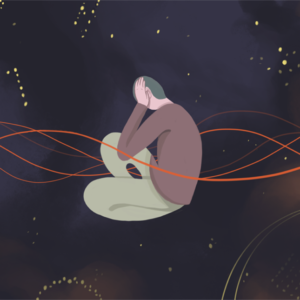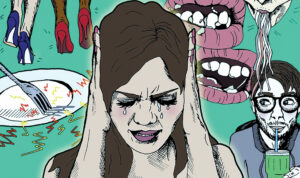Noise sensitivity anxiety is a condition that can cause a lot of discomfort and stress. If you are affected by this, it can be difficult to go about your day-to-day life. This is because everyday noises that most people don’t even notice can be incredibly overwhelming and distracting for someone with this condition. In this blog post, we will discuss what noise sensitivity anxiety is, the symptoms, and how to manage it.
Contents
Defining Noise Sensitivity Anxiety

As the name suggests, noise sensitivity anxiety is an anxiety disorder that is characterized by a heightened sensitivity to noise. This can include any type of noise, from loud noises like sirens to more subtle sounds like the hum of a fan. For many people with noise sensitivity anxiety, even background noises can be bothersome and cause a lot of distress.
In contrary to the name, noise sensitivity anxiety is actually a form of OCD that is commonly comorbid with other anxiety disorders. The repetitive and intrusive thoughts caused by OCD can often be triggered by certain noises. This can then lead to a cycle of anxiety and avoidance.
Types
Noise sensitivity anxiety is an umbrella term for a few different types of conditions. While they vary in terms of symptoms and severity, they all share the common feature of being overly sensitive to noise. We will understand each type in detail.
Misophonia
Misophonia is a condition in which certain sounds trigger an intense emotional reaction. These reactions can range from annoyance and irritation to anger and rage. In some cases, the mere sound of someone eating or breathing can be enough to trigger this reaction. People with misophonia often describe it as feeling “hate” towards the sound.
Selective Sound Sensitivity Syndrome (SSS)
Selective sound sensitivity syndrome (SSS) is a condition that causes people to be sensitive to specific sounds. These can be any type of sound, but they are often high-pitched or loud noises. SSS is different from misophonia in that the reaction is not always negative. In some cases, the sound may actually be calming or soothing.
Hyperacusis
Hyperacusis is a condition that causes people to perceive all sounds as being too loud. This can make everyday noises painfully loud and overwhelming. In severe cases, even soft sounds can be unbearable. Hyperacusis is often accompanied by tinnitus, which is a ringing or buzzing noise in the ears. It can also make it difficult to hear speech, which can lead to communication difficulties.
Recruitment
Recruitment is a condition that causes people to perceive sound as being louder than it actually is. This can be due to damage to the inner ear or nerve deafness. Recruitment can make even soft sounds painfully loud and can be very debilitating. This behavior can be observed in people with other forms of hearing loss as well.
Auditory hypersensitivity
Lastly, auditory hypersensitivity is a physiological reaction to sound that causes the person to feel pain or discomfort. This can be caused by a variety of things, such as damage to the ear or an underlying medical condition. Although it isn’t classified as a mental disorder, it can still cause a lot of distress. It can be psychologically burdening to stay on watch for the possibility of pain or discomfort.
Causes

The exact cause of noise sensitivity anxiety is unknown. However, there are some possible explanations.
- Brain chemistry and composition
It is a belief that people with noise sensitivity anxiety may have a different brain composition than those without the condition. This difference can be due to things like genetic predisposition or early life experiences.
- Hormones
Hormones can also play a role in developing disorders. This is because they can affect the way the brain processes information and how it responds to stimuli. For example, people with noise sensitivity anxiety may have an imbalance of the hormone cortisol. This can lead to a heightened state of anxiety and make it more difficult to cope with stress.
- Genetics
There is some evidence to suggest that genetics may play a role in the development of this disorder. This is because mental or psychiatric disorders often runs in families. If your parents or grandparents suffer from noise sensitivity anxiety, you may be more likely to develop it as well.
- Medical Conditions
There are a few medical conditions that can cause noise sensitivity anxiety. One of these conditions is Meniere’s disease, which is a disorder of the inner ear. Meniere’s disease can cause dizziness, vertigo, and tinnitus. It can also make sounds seem louder than they actually are. Another condition that can cause noise sensitivity anxiety is migraines. People who suffer from migraines often report increased sensitivity to sound during a migraine attack.
- Trauma or Stress
Noise sensitivity anxiety can also be caused by trauma or stress. This is because trauma and stress can lead to changes in the brain that make people more sensitive to noise. One study found that people who had experienced trauma were more likely to develop these problems.
- Previous injuries
Lastly, previous injuries can also cause anxiety around noise. This is because injuries to the head or ears can damage the nerves or auditory system. This damage can make people more sensitive to noise and more likely to develop issues.
These are all the possible explanations for noise sensitivity anxiety. However, the exact cause is still unknown. If you suffer from these struggles, it is important to seek help from a mental health professional. They can help you manage your condition and cope with the symptoms.
Signs And Symptoms
The symptoms of noise sensitivity anxiety can vary depending on the type and severity of the condition. However, there are some common symptoms that people with this condition often experience. These include:

- Avoidance of Noise: People with noise sensitivity anxiety often avoid places or situations where they know there will be loud noises. This can make it difficult to participate in everyday activities like going to the movies or attending a concert.
- Anxiety: Many people with noise sensitivity anxiety feel anxious or nervous when exposed to loud noises. This can lead to a feeling of panic or dread.
- Anger: Misophonia, in particular, can cause a lot of anger and frustration. The sound may trigger a negative emotional reaction that can be very difficult to control.
- Distress: Noise sensitivity anxiety can be extremely distressing and debilitating. It can make it difficult to concentrate or even sleep. The constant worry and stress can also lead to other problems such as headaches and stomachaches.
- Shame: People with noise sensitivity anxiety often feel ashamed or embarrassed. This is because they may feel like they are the only ones who are bothered by noise.
- Physical reactions: Some people with noise sensitivity anxiety experience physical reactions when exposed to loud noises. These can include headaches, nausea, and dizziness.
These are all the consequences of noise sensitivity anxiety. As you can see, this condition can have a significant impact on a person’s life. People may experience different symptoms depending on the severity of their condition. If you think you may suffer from this problem, it is important to seek help from a mental health professional.
Effects On Life
Now that we are aware of the meaning, signs and causes of noise sensitivity anxiety, it is important to understand the effects of this condition on a person’s life.
- One of the most significant effects of noise sensitivity anxiety is the impact on social life. People with this condition often avoid social situations where there will be loud noises. This can make it difficult to maintain relationships and participate in activities that are enjoyable.
- Another effect of noise sensitivity anxiety is the impact on work life. People with this condition may have difficulty concentrating in a loud environment. This can make it difficult to perform well at work or participate in meetings.
- It can also be difficult to travel when you have noise sensitivity anxiety. This is because loud noises can trigger anxiety and cause physical reactions such as headaches and nausea.
- Noise sensitivity anxiety can also lead to depletion of energy levels. This is because the constant worry and stress can be exhausting. People may also find it difficult to sleep, which can further impact energy levels.
- Lastly, it can also lead to other problems such as depression and anxiety. This is because the condition can be very distressing and debilitating.
These are all the ways in which noise sensitivity anxiety can affect a person’s life. As you can see, this condition can have a significant impact on many aspects of a person’s life. The consequences can severely impair a person’s quality of life.
Tips To Deal
There are also some things that you can do at home to help manage the symptoms of noise sensitivity anxiety. Here are some tips:

- Identify your triggers: Once you know what sounds trigger your anxiety, you can start to avoid them.
- Create a safe space: If you live in a noisy environment, create a place where you can go to escape the noise. This could be a quiet room in your house or even outside in nature.
- Use earplugs: Earplugs can help to reduce the amount of noise that you are exposed to.
- Relaxation techniques: relaxation techniques such as yoga and meditation can help to reduce stress and anxiety. Some examples include progressive muscle relaxation, deep breathing, and visualization.
- Talk to someone: Talking to a friend or family member about your anxiety can help you to feel supported and understood. They can also help in providing you with resources and information.
- Seek professional help: If your anxiety is severe, it may be helpful to seek out professional help. A therapist can help you to understand and manage your anxiety. They may use techniques and approaches that can help you to feel better. Some of the most effective and evident approaches that help in dealing with these problems include:
-Cognitive Behavioral Therapy (CBT)
-Acceptance and Commitment Therapy (ACT)
-Medication
These are all tips that can help you to deal with noise sensitivity anxiety. If you think you may suffer from this condition, it is important to seek the right kind of support and assistance. This way, you can start to manage your anxiety and improve your quality of life.
Conclusion
In conclusion, noise sensitivity is a type of OCD that can have a significant impact on many aspects of a person’s life. The condition can be very distressing and debilitating. However, there are things that you can do to help manage the symptoms of noise sensitivity anxiety. If you think you may suffer from this condition, it is important to seek professional help so that you can receive timely intervention.
If you or someone you know is looking for affordable, effective, and confidential OCD treatment, you can consider contacting Therapy Mantra. We have a team of expert therapists who can help you to overcome your OCD and live a life that is free from anxiety and fear. Contact us today to book an online therapy session or download our free OCD treatment app on Android or iOS for more information!


